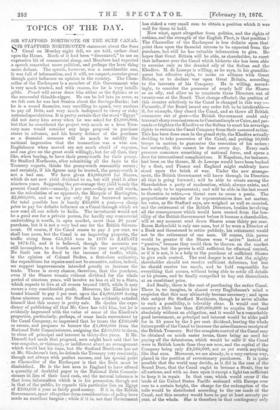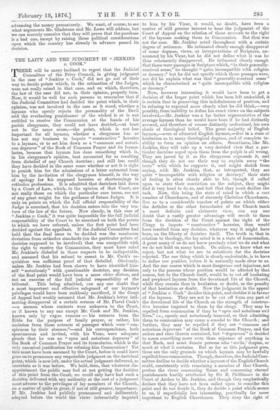TOPICS OF THE DAY.
SIR STAFFORD NORTHCOTE ON THE SUEZ CANAL.
SIR STAFFORD NORTHCOTE'S statement about the Suez Canal on Monday night fell, we are told, rather. dead upon the House. Mach of it had been "discounted," to use an expressive bit of commercial slang, and Members had expected a speech somewhat more political, and perhaps the least thing more defiant. The speech, however, was a considerable one, it was full of information, and it will, we suspect, exercise great though quiet influence on opinion in the country. The Chan- cellor of the Exchequer is a member of this Government who is very much trusted, and with reason, for he is very intelli- gible. Punch will never draw him either as the Sphinx or as the successful thimble-rigger. He can be led into an error, as we felt sure he was last Session about the Savings-Banks; but he is a sound financier, very unwilling to spend, very anxious to pay off Debt, and very much indisposed to viewy or risky national speculations. It is pretty certain that the word "Egypt" did not carry him away when he was asked for £4,000,000, but that he considered the project very much as a keen Trea- sury man would consider any large proposal to purchase stores in advance, and his hearty defence of the purchase as a financial measure will do much to solidify the national impression that the transaction was a wise one. Englishmen when moved are not much afraid of expense, and can give on the great scale willingly, but for all that, they like, when buying, to have their pennyworth for their penny. Sir Stafford Northcote, after submitting all the facts to the Treasury experts, thinks the pennyworth reasonably secure ; and certainly, if his figures may be trusted, the pennyworth is not a bad one. We have given £4,000,000 for Shares, which do not now yield dividend to us, but will yield it after nineteen years. Supposing the per-centage they yield is only the present Canal rate—namely, 5 per cent.—they are still worth, on the calculation of an opponent, the Marquis of Hartington, £2,000,000, and as we pay only 3f for borrowed money, • the total possible loss is barely £65,000 a year,—a cheap price to pay for definite influence on a Canal through which we now send all our reliefs to .India. The investment would not • be a good one for a private person, for hardly any commercial undertaking is worth, in open market, more than 20 years' purchase, but it is not a very bad one for the British Govern- ment. Of cou:rse, if the Canal ceases to pay 5 per cent. we shall lose more, but the Canal is an improving property, the traffic rising from 654,915 tons in 1870 to 2,423,672 in 1874-75, and it is believed, though the accounts are still incomplete, to a fourth more in the year now expiring. No limit can be fixed to the increase of traffic, while, in the opinion of Colonel Stokes, a first-class authority, the expenditure for repairs need not be excessive, unless, indeed, we support improvements intended greatly to increase the trade. There is every chance, therefore, that the purchase, even if the Shares remain without dividend for the whole period of nineteen years, will involve no loss at all to a State, which expects to live at all events beyond 1895, while it may secure a very considerable profit. Moreover, the Khedive has bound himself to pay 5 per cent, upon the £4,000,000 during those nineteen years, and Sir Stafford has evidently satisfied himself that this money is pretty safe. He doubts the expe- diency of publishing all that Mr. Cave has told him, but he is evidently impressed with the value of some of the Khedive's properties, particularly, perhaps, of some lands surrendered by the Canal Company, so impressed that he treats the £200,000 as secure, and proposes to borrow the £4,000,000 from the National Debt Commissioners, assigning the £200,000 to them, to clear off principal and interest in thirty-five years. If Mr. Disraeli had made that proposal, men might have said that he was sanguine, or visionary, or indifferent about an arrangement which would last his time, but Sir Stafford Northcote has sat at Mr. Gladstone's feet, he defends the Treasury very resolutely, though not always with perfect success, and his special point , as Chancellor of the Exchequer is that the Debt must be diminished. He is the last man in England to have offered a quantity of doubtful paper to the National Debt Commis- sioners in lieu of their hard cash, and the natural inference is that from information which is in his possession, though not in that of the public, he regards this particular lien on Egypt of £200,000 a year as fairly good money. If it is, the British Government, apart altogether from considerations of policy have made an excellent bargain ; while if it is, not that Government has risked a very small sum to obtain a position which it was well for them to hold.
Now what, apart altogether from politics, and the rights of nations, and the strength of the English Fleet, is that position ?' The Chancellor of the Exchequer is less definite upon that point than upon the financial returns to be expected from the. purchase, but still he has valuable information to give. He hopes that Great Britain will be able, as shareholder, to exert that influence over the Canal which hitherto she has been able- to exercise only as the dreaded ally of the Sultan and the Khedive. M. de IRsseps is willing, as he says, in his grandilo- quent but effective style, to make an alliance with Great Britain, or to declare war upon Great Britain, according to the interests of his Company. He is willing, accord- ingly, to consider the possessor of nearly half the Shares. as an ally, and allow us to nominate three Directors out of twenty-one at the Board. That change effected, the position of this country relatively to the Canal is changed in this way, :— Formerly, if the Board issued any order felt to be intolerable— if, for example, they closed the Canal, and so threw all British commerce out of gear—the British Government could only transmit sharp remonstrances to Constantinople or Cairo, and per- suade or frighten the Khedive or the Sultan to exert his sovereign rights to restrain the Canal Company from their menaced action. This has been done once in the grand style, the Khedive actually deciding to take possession of the Canal, and putting 10,000 troops in motion to guarantee the execution of his orders ; but naturally, this cannot be done every day. Every such pressure consumes something of national force, and opens a door for international complications. If Napoleon, for instance, had been on the throne, M. de Lesseps would have been backed by a fleet, and France and England might suddenly have stood upon the brink of war. Under the new arrange- ment, the British Government will know through its Directors. all that is going forward ; will be able to create among the Shareholders a party of moderation which always exists, and needs only to be represented; and will be able in the last resort to threaten to retire,--a threat sure to cause a panic. The proportionate number of its representatives does not matter, for votes, as Sir Stafford says, are weighed as well as counted, and the retirement of the British Directors, besides involving all the consequences which would have ensued from the hos- tility of the British Government before it became a shareholder, will at any moment send down Shares some thirty per cent. Baron Rothschild is only one man, but if he were a Director of a Bank and threatened to retire publicly, his retirement would not be the retirement of one man. Of course, this power would be greater if the Shares were " active " instead of "passive," because they could then be thrown on the market in heaps, but the power is still sufficient for effectual control,. or if it is not, it is a help to the purchase of sufficient Shares. to give such control. The real danger is not lest the mighty shareholder should not receive sufficient deference, but lest he should receive too much, and be held responsible for everything that occurs, without being able to settle all details as he pleases, and be finally compelled to buy out dissentients at an exorbitant price.
And finally, there is the cost of purchasing the entire Cana, There is, we imagine, in almost every Englishman's mind a suspicion that this may ultimately become necessary ; and upon this subject Sir Stafford Northcote, though he never alludes to such a possibility, is tolerably clear. It would cost the country a little less than £20,000,000 to acquire the Cana/ absolutely without an obligation, and it would be a remarkably good investment, as principal and interest would be alike paid for in 35 years by the 5 per cent, dividend, leaving the whole future profit of the Canal to increase the miscellaneous receipts of the British Treasury. But the complete control of the Canal may be obtained on much easier terms, there being no need for paying off the debentures, which would be safer if the Canal were in British hands than they are now, and the capital of the Company being only £9,360,000, not as yet worth anything like that sum. Moreover, we are already, in a very curious way, placed in the position of reversionary purchasers. It is quite possible that the world may decide, as it did in the case of the Sound Dues, that the Canal ought to become a Strait, free to all nations, and with no dues upon it except a light tax sufficient to keep it in repair. In that case, which would occur if the trade of the United States Pacific seaboard with Europe ever rose to a certain height, the charge for the redemption of the tolls would be distributed according to the use made of the Canal, and this country would have.to pay at least seventy per cent, of the whole. She is therefore in that contingency only advancing the money prematurely. We want, of course, to see what arguments Mr. Gladstone and Mr. Lowe will adduce, but we can scarcely conceive that they will prove that the purchase is a bad one, except by raising those political considerations upon which the country has already in advance passed its decision.



































 Previous page
Previous page